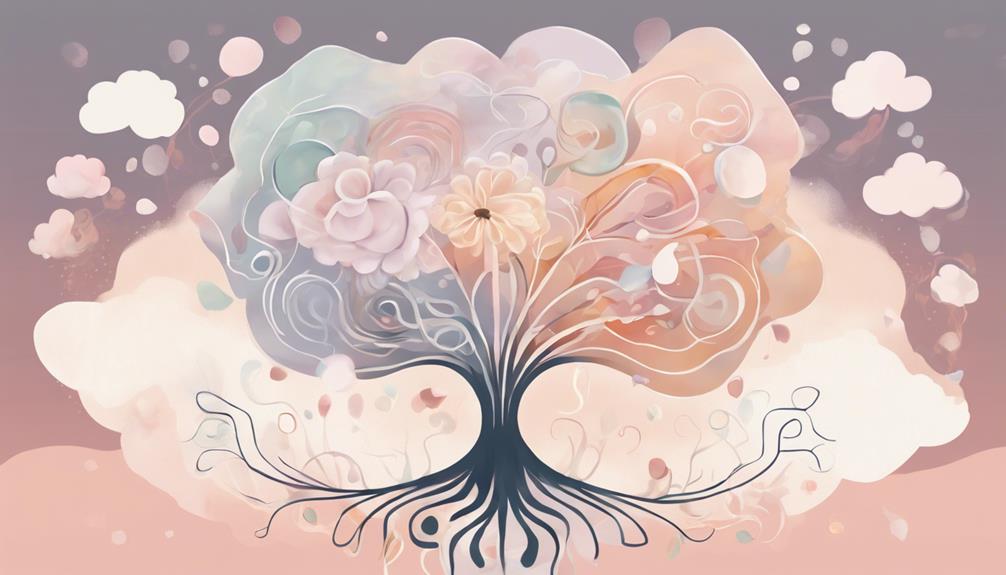As you encounter poetry, you're met with a reflection of yourself, with words that evoke emotions, spark memories, and foster a deep sense of connection and understanding. Poets expose their vulnerabilities, creating relatable works that investigate raw emotions, leading to authenticity. The nuances of language convey emotions precisely, creating an emotional connection between poet and reader. Personal memories are deeply rooted in the poetic experience, with words triggering episodic recall of memories. As you explore the emotional impact of poetry, you'll uncover the therapeutic release it provides, and how it reveals the intricacies of human emotions, revealing a deeper understanding of yourself and the human condition – and there's more to discover.
The Power of Vulnerability

As you explore the world of poetry, you'll discover that the most evocative and relatable works often stem from the poet's willingness to expose their own vulnerabilities, laying bare their emotions and experiences for the reader to resonate with. This courage to be vulnerable allows poets to investigate raw emotion, creating a sense of authenticity that resonates deeply with readers. By sharing their inner struggles and fears, poets demonstrate remarkable inner strength, often turning their weaknesses into a source of empowerment. This vulnerability also fosters a sense of connection between the poet and reader, as readers can identify with the emotions and experiences shared. The poet's willingness to be vulnerable creates a safe space for readers to confront their own emotions, leading to a deeper emotional impact. As you explore the world of poetry, you'll find that the most impactful works are those that dare to investigate, laying the foundation for a profound emotional connection between poet and reader.
Emotional Resonance in Language

Through the strategic use of language, poets can evoke powerful emotions in their readers, exploring the emotional resonance of individual words to create a profound impact. As you explore a poem, you may find yourself responding to the subtle nuances of language, which convey emotions with remarkable precision. This is due to the poet's ability to tap into the linguistic nuances that evoke emotional authenticity. By selecting words that resonate with your own experiences, poets can create a sense of emotional connection, making the poem feel deeply personal. You may find yourself reflecting on your own emotions, memories, and experiences as you read, as the poet's words awaken a deep emotional resonance within you. The poet's mastery of language allows them to convey complex emotions with remarkable accuracy, evoking feelings that may have been previously unarticulated. As you engage with the poem, you begin to appreciate the poet's skill in crafting a language that speaks directly to your emotions, fostering a profound emotional connection.
Memory and the Poetic Experience

Your emotional connection to a poem can also be deeply rooted in your personal memories, which the poet's words have the power to evoke, making the poetic experience a highly subjective and intimate one. As you read a poem, you may find yourself recalling memories from your past, triggered by the poet's use of language. This episodic recall can be a powerful catalyst for emotional connection, as the poem's themes and imagery tap into your own experiences and emotions. The poet's words can evoke sensory memories, transporting you back to a specific time and place, and rekindling the emotions that accompanied it. This sensory evocation can be incredibly potent, allowing you to relive memories in vivid detail. As you engage with the poem, you may find that your memories and emotions become intertwined with the poet's words, creating a deeply personal and emotional experience.
The Cathartic Effect of Verse

Reading a poem can be a therapeutic release, allowing you to confront and process pent-up emotions, and the cathartic effect of verse lies in its ability to tap into your emotional psyche, providing an outlet for the expression of feelings you may have struggled to articulate. This emotional purging enables you to release built-up emotions, bringing a sense of relief and calm. Through personal confessions, poets often share their own experiences, creating a sense of solidarity and understanding between the poet and reader. This shared emotional understanding allows you to connect with the poet on a deeper level, validating your own emotions and experiences. The cathartic effect of verse also extends to the poet themselves, as the act of writing becomes a form of emotional purging, allowing them to process and deal with their emotions. This reciprocal exchange of emotions creates a powerful bond between the poet and reader, fostering a deeper understanding of the human experience.
Unlocking the Human Condition

As you connect with the poet's emotional confessions, you begin to unravel the complexities of the human experience, where poetry becomes a window into the collective psyche, revealing the intricacies of human emotions and the struggles that unite us all. Through poetry, you're able to tap into the raw emotional authenticity of the poet, fostering a sense of human connection that transcends boundaries. This connection is rooted in the poet's ability to articulate the often-inexpressible emotions that lie deep within us, making their struggles and triumphs relatable and, consequently, universal. As you explore further into the poet's world, you start to recognize the shared human experiences that bind us together – the struggles, the fears, the hopes, and the dreams. It's this emotional authenticity that allows poetry to reveal the human condition, exposing the complexities and nuances of our collective emotional landscape.
Frequently Asked Questions
Can Poetry Be Used as a Form of Therapy for Mental Health?
You wonder if poetry can be a therapeutic outlet for mental health. Essentially, can you harness the emotional release of writing verse to heal? Through personal reflections, you can tap into your subconscious, unearthing buried emotions. Therapeutic journaling, in the form of poetry, allows you to process complex feelings, gaining clarity and perspective. By putting pen to paper, you can begin to untangle the knots of your mind, fostering a deeper understanding of yourself and your mental well-being.
How Does Poetry Influence Our Emotional Intelligence and Empathy?
As you explore the world of poetry, you'll discover how it influences your emotional intelligence and empathy. Poetry's emotional resonance allows you to tap into the poet's emotions, fostering an empathetic understanding of their experiences. This, in turn, enhances your ability to understand and connect with others on a deeper level, increasing your emotional intelligence. Through poetry, you'll develop a more nuanced understanding of the human experience, cultivating empathy and compassion for others.
Is Poetry More Effective in Conveying Emotions Than Other Art Forms?
As you stand in a crowded museum, surrounded by masterpieces, a single poem on the wall catches your eye, evoking a lump in your throat. You wonder, is poetry more effective in conveying emotions than other art forms? Perhaps it's because poetry can distill complex emotions into few, well-chosen words, creating an emotional resonance that transcends cultural nuance. Its concise language allows for a depth of feeling that other art forms can't replicate, making it a uniquely potent emotional catalyst.
Can Poetry Be Used to Process Collective Trauma and Grief?
You're wondering if poetry can be a tool for processing collective trauma and grief. It's possible that poetry can facilitate cultural catharsis, allowing communities to confront and release pent-up emotions. Through communal lamentation, poetry can create a shared experience, validating individual experiences and fostering empathy. By giving voice to collective pain, poetry can help communities begin to heal and move forward.
Do Poets Have a Unique Emotional Intelligence or Sensitivity?
As you ponder the poet's inner world, you may wonder: do they possess a unique emotional intelligence or sensitivity? The answer lies in their intuitive grasp of human emotions, which they tap into through creative empathy. Like Shakespeare's Hamlet, who sensed Ophelia's turmoil, poets tap into the collective unconscious, channeling emotions into verse. This poet's intuition allows them to craft resonant works that echo within us, a demonstration of their exceptional emotional sensitivity.


